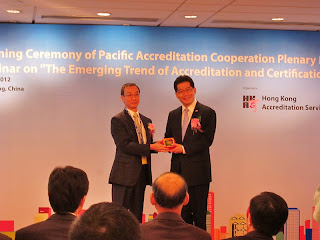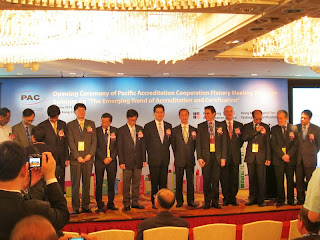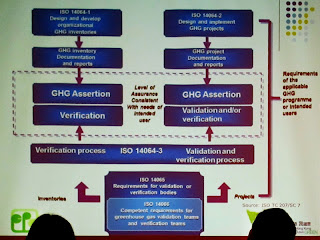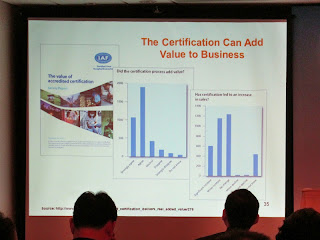Souvenir Presentation
Mr. Shinichi Iguchi (Chairman, PAC) introduced ISO certification and PAC Conformity Assessment Scheme (CAS). ISO Survey 2010 was discussed and ISO 9001 certificates was dominated.
Then the structure of 3rd party Conformity Assessment Scheme (CAS) was introduced and it aimed that "Certified once, accrepted everywhere".
Group photo with speakers
Morning Session - Accreditation, Certification and Market Access
The first speaker was Mr. Brett Abraham (Chairman of the MLA Group, PAC) and his topic entitled "Benefits of Multilateral Recognition Arrangement in Accreditation to Business". The objectives of an MLA were to enhance government, industry and consumer confidence in regional and world trade; and to support emerging industries and technologies by providing accreditation to certification bodies.
The International Accreditation Forum (IAF) MLA was via the operations from three regional groups' MLAs. They were the Pacific Accreditation Cooperation (PAC), the European co-operation for Accreditation (EA), and the InterAmerican Accreditation Cooperation (IAAC). The direct benefits of an MLA to business were identified by Monash University research in Aug 2006. They were Process, Product, People management and Customer relations improvement from ISO 9001 certification; moreover, improvement of corporate image, identification of areas for improvement and compliance with regulatory requirements were three reasons for adoption of EMS certification.
Mr. Wong introduced the position of certification in Quality Infrastructure which between Society and Business Concerns, where Societal Concerns included Health, Safety, Environment, economic well being, fair trade, etc; Business Concerns included Trading, Quality, Profitability, Manufacturing, etc. The three key elements of Quality Infrastructure were Standards, Metrology and Accreditation.
Increasing demand in certification and public concerns over food safety, workplace health and safety, and information security, HKAS supported these emerging system certifications and extended scope to cover this management systems. The Green House Gase (GHG) verification and validation and Energy Management System Certification were under development.
Mr. Graham Talbot (Chairman of the European Co-operation for Accreditation (EA)) was the third speaker and his presentation title was "Accreditation and Market Access in Europe". Mr. Talbot said to promote free trade in Europe that it did not create or maintain barriers to intra-EU trade. New legislative frameworks (Regulation EC 765/2008, 764/2008 and Decision 768/2008/EC) were introduced to focus on marketing of products included market surveillance and accreditation which published in August 2008 and came into force on 1 Jan 2010.
The role of EA was to define, harmonize and build consistency in accreditation as a service in Europe, and to maintain a multilateral agreement (MLA) on mutual recognition between the accreditation schemes. The EA accreditation on different schemes in 2011 was demonstrated below.
Prof. Pak-Chung Ching (Chairman, HKCTC) was the fourth speaker and his topic entitled "Certification Industry in Hong Kong: Current Situation and Prospect".
Prof. Ching introduced how HK Government continuous support on the development of certification services below:
1989 - HKQAA to promote ISO 9000 series
1991 - Product certification scheme for concrete (QSPSC)
1996 - ISO 9000 certificate of contractors for public works was required
1998 - HKAS launched accreditation scheme for certification body (CB)
2003 - HKAS joined PAC's MRA for QMS certification
2007 - ISO 22000 certification
2009 - Certification of telecommunication equipment transfer to private CB
2011 - HKAS joined PAC's MRA for EMS and Product certification
The following diagram showed the existing certification service in Hong Kong.
Finally, Prof. Ching briefed some growing potential for new certification service included ISO 27001, ISO 50001, ISO 14064, ISO 14067 and Social Responsibility. He concluded that there should be good prospect for certification.
The fifth speaker was Mr. Kam-Lam Tsang (General Manager (Env Mgt), the Hong Kong Productivity Council) and he presented the topic "Support for the Chinese Medicine Trade - Chinese Materia Medica Product Certification Scheme". Mr. Tsang said HKPC applied ITF funding to develop this certification scheme.
The objective of the Product Certification Scheme (PCS) for Chinese Materia Medica (CMM) were to promote and develop the local testing and certification services in the area of Chinese materia medica; to build and protect the consumers' confidence and health; and to assist Chinese materia medica traders or suppliers to achieve quality excellence and build up branding. The development and implementation arrangement of this PCS for CMM were showed below. It involved accredited certification body and laboratory.
The sixth speaker was Mr. Anil Jauhri (Director, the National Accrditation Board for Certification Bodies, India) and his title named "Accreditation and Certification Scheme for Ayurvedic Medicines in India".
Ayurveda (= Ayus + Veda) meaning 'Knowledge concerning maintenance of Life'
Mr. Jauhri said that it was Ancient Knowledge from 5000 years old-Charak and Susruta tradition of Ayurvedic medicine and surgery. Development of voluntary certification scheme could enhance consumer confidence, promote regulatory compliance and international acceptance. The following diagram showed two levels of certification included Ayush Standard Mark and Ayush Premium Mark.
Prof. Edward Humphreys (Convener of the ISO/IEC Working Group of Information Security Management System) was the seventh speaker and his presentation entitled "ISO27001 Information Security Management System Increases Your Competitiveness".
Prof. Humphreys said the implementation of ISMS improved management of risks to reduce threats, to minimize impacts and reduce costs, as well as, to protect business assets. The ISMS implementation in Cloud and Web services would be the trend for increasing competitiveness. Prof. Humphreys mentioned that ISO/IEC 27001:2005 currently was under revision to harmonize structure and some future developments were included Cloud Computing (ISO/IEC 27017/27018), Protection of Personal Data, Telecoms (ISO/IEC 27011), IT Service Management (ISO/IEC 27013) and Finance (ISO/IEC 27015), etc.
Q&A Session
During the Q&A Session, I had a question about the Product Certification Scheme (PCS) for Chinese Materia Medica (CMM) that there were no reference material provider for Chinese Medicine. The second question I asked to Prof. Humphery about the version of ISO/IEC 27001 to consolidate the 133 control objective and controls.
Afternoon Session - Using Green Certification as a Business Tool
Mr. Jianhua Xiao (Chief Executive, the China National Accreditation Service for Conformity Assessment) was the first speaker in afternoon session and his presentation topic named "The Role of Green Certification and Accreditation in the 12th Five Year Plan of China".
Mr. Xiao introduced the Part VI of the 12th Five-Year Plan for National Economic and Social Development of the People's Republic of China which was Development of Resource-Conserving and Environmental Friendly Society. Moreover, the 12th Five-Year Plan for Certification and Accreditation (2011-2015) was issued by Certification and Accreditation Administration of RPC (CNCA) and the 12th Five-Year Plan for Accreditation (2011-2015) was issued by China National Accreditation Service for Conformity Assessment (CNAS). The following showed the total certificates issued by CNAS accredited Certification Bodies.
Some Green Certification and Accreditation schemes were mentioned. It included Organic Product Certification (Started in 1994), China Environmental Labeling (Started in 1994), Energy Conservation Certification (Started in 1998). Mr. Xiao concluded they should work very hard to meet the needs of green development for economy and society of China during the 12th Five-Year Plan.
Mr. Chuen-Fai Wong (Principal Environmental Protection Officer, EPD) was the second speaker of this session and his topic was "Importance of Greenhouse Gases Validation and Verification of Hong Kong Business".
Mr. Wong briefed two importance of GHG local agenda. They were National Communicatins to prepare an emission inventories of GHG in HKSAR and Climate Change Strategy and Action Agenda to reduce GHG and mitigation measures. Hong Kong's Target was to reduce 50-60% carbon intensity by 2020 as compared with 2005 level.
Mr. Wong said the 3 years carbon audit programme for Government Buildings and Facilities was a new initiatives. Moreover, EPD supported HKAS to introduce an accreditation service to accredit certification bodies for GHG validation and verification.
The third speaker was Dr. Michael Lam (CEO, The Hong Kong Quality Assurance Agency (HKQAA)) and his presentation named "How Green Certification Can Enhance Business Competitiveness?"
Dr. Michael Lam said HKQAA would like to promote CSR to Hong Kong. Then Dr. Lam discussed how many crisis we faced such as financial crisis, climate change crisis, uneven distribution of wealth, etc. Customers had higher expectation of CSR performance of corporations. It could also be opportunities that certification added value to business.
Finally, Dr. Lam would like to work hand in hand to uphold the credibility and effectiveness of certification.
The last speaker was Mr. Nelson SL Ho (Senior Manager, HKSTPC) and his topic was "Benefits of Implementing ISO 50001 - Experience Sharing by the Hong Kong Science Park".
Mr. Ho introduced the 22 hectare Hong Kong Science Park, which provided 20 state-of-the-art laboratory-fitted buildings offering 220,000 square meters of office space with Fully equipped laboratories and engineering services available for hourly rental or on project basis, and Commitments on Green and Sustainability Initiatives. He mentioned the achievement of ISO 50001:2011 certification for FM of HKSTPC by Sep 2011. Total energy saving was 9.5%, HVAC saving was 15% and Lighting saving was 1.5%.
Q&A Session was held at the end of seminar.
Reference:
HKCTC - http://www.hkctc.gov.hk/en/about.html
Mr. Wong briefed two importance of GHG local agenda. They were National Communicatins to prepare an emission inventories of GHG in HKSAR and Climate Change Strategy and Action Agenda to reduce GHG and mitigation measures. Hong Kong's Target was to reduce 50-60% carbon intensity by 2020 as compared with 2005 level.
Mr. Wong said the 3 years carbon audit programme for Government Buildings and Facilities was a new initiatives. Moreover, EPD supported HKAS to introduce an accreditation service to accredit certification bodies for GHG validation and verification.
The third speaker was Dr. Michael Lam (CEO, The Hong Kong Quality Assurance Agency (HKQAA)) and his presentation named "How Green Certification Can Enhance Business Competitiveness?"
Dr. Michael Lam said HKQAA would like to promote CSR to Hong Kong. Then Dr. Lam discussed how many crisis we faced such as financial crisis, climate change crisis, uneven distribution of wealth, etc. Customers had higher expectation of CSR performance of corporations. It could also be opportunities that certification added value to business.
Finally, Dr. Lam would like to work hand in hand to uphold the credibility and effectiveness of certification.
The last speaker was Mr. Nelson SL Ho (Senior Manager, HKSTPC) and his topic was "Benefits of Implementing ISO 50001 - Experience Sharing by the Hong Kong Science Park".
Mr. Ho introduced the 22 hectare Hong Kong Science Park, which provided 20 state-of-the-art laboratory-fitted buildings offering 220,000 square meters of office space with Fully equipped laboratories and engineering services available for hourly rental or on project basis, and Commitments on Green and Sustainability Initiatives. He mentioned the achievement of ISO 50001:2011 certification for FM of HKSTPC by Sep 2011. Total energy saving was 9.5%, HVAC saving was 15% and Lighting saving was 1.5%.
Q&A Session was held at the end of seminar.
Reference:
HKCTC - http://www.hkctc.gov.hk/en/about.html





























沒有留言:
發佈留言